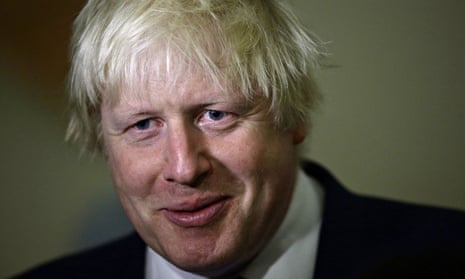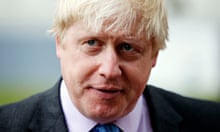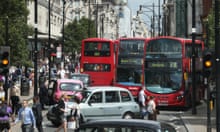Boris Johnson wants to secure control of the courts and the prosecution service, a move which would put London’s mayor in charge of the criminal justice system in the capital, the Guardian has learned.
The plan would see control wrested from Whitehall and the devolution of the most important pillars of the justice system.
Labour politicians are studying the plan, and Manchester may try to join London as “outriders” for the devolution of criminal justice to a regional level.
The government has already been lobbied about the radical plans, which supporters claim would limit the loss of officers from frontline policing when more deep cuts are made after the 2015 general election.
London’s Conservative mayor is already responsible for the Metropolitan police. He sets its budget and strategic priorities and is able to dismiss its chief.
The plans would see a New York-style system, where its mayor holds to account those responsible for investigation and arrest, through to charging, prosecution and sentencing.
Some in Whitehall will see it as a grab for power from Johnson, who is seen to be in competition with the home secretary, Theresa May, for the Tory leadership if a vacancy were to open up.
But Stephen Greenhalgh, Johnson’s deputy mayor for policing, believes devolution would deliver a better service and allow a greater focus on the holy grail of the justice system: reducing repeat offending.
He said: “The criminal justice system should be held to account as the Met is in London, otherwise these are unaccountable agencies not answering to the people of London.” The different parts of the justice system “play pass the parcel” when it comes to problem solving, he said.
Greenhalgh said savings would come from getting the police, courts and prosecutors answerable to the same goals and by “co-locating them in the same buildings, working off the same IT systems, with the same priorities.”
He said the justice system was stuck in the past: “It is a 19th-century construct with 19th-century technology which needs to move into the 21st century.”
Labour’s Tony Lloyd, the police and crime commissioner in Greater Manchester, said: “It makes sense to explore the possibility of bringing local Crown Prosecution Service and court services under the oversight of police and crime commissioners, establishing transparency and public accountability throughout the entire criminal justice system.
“Not only will this deliver savings for the public purse, but it will mean a better service for victims of crime – for too long ignored – witnesses and the local community.”
Sir Peter Fahy, chief constable of Greater Manchester police, said: “It could create incentives for agencies to work together, to put fewer people in prison and keep more money to invest in the community through more preventative activity.”
The Johnson administration believes the reform would minimise jobs cuts facing the police, CPS and courts.
Greenhalgh said that, without the reform, the Met would struggle to maintain officer numbers as the new round of cuts start to bite. Cuts made since 2010 have reduced police numbers by 34,000 and there are estimates that another 34,000 jobs may go in a further round of cuts, with the posts of frontline officers more at risk this time.
While Johnson has oversight of the Met, Greenhalgh is, in effect, the police and crime commissioner for London. Met police commissioner Sir Bernard Hogan-Howe has operational independence of Britain’s biggest police force.
Greenhalgh said London had experienced a fall in crime, but was suffering greater delays in the courts: “With fewer defendants, we should be seeing swifter justice, but we are not.”
Greenhalgh said one powerful person driving the three key arms of the justice system would help on issues such as tackling the 5,000 persistent offenders who cause the most harm in London: “For the victim its not three separate agencies,”, said Greenhalgh, who also wants devolution of the youth justice system and, eventually, the probation service.
The police answer to Greenhalgh representing London’s mayor, but the CPS answers to the attorney general and the courts system to the Ministry of Justice.
Greenhalgh argues that Labour and the Conservatives should adopt the plan: “We want both parties to sign up. Whitehall needs to let go.”
Since the London’s mayor took responsibility for policing in 2008, London has fought with Whitehall for greater powers.
Johnson’s first policing czar, Kit Malthouse, angered Met chiefs and government when he claimed to have wrested control of the force off the Home Office and had his “hands on the tiller” of the force having “elbowed the Home Office out of the picture”.








Comments (…)
Sign in or create your Guardian account to join the discussion